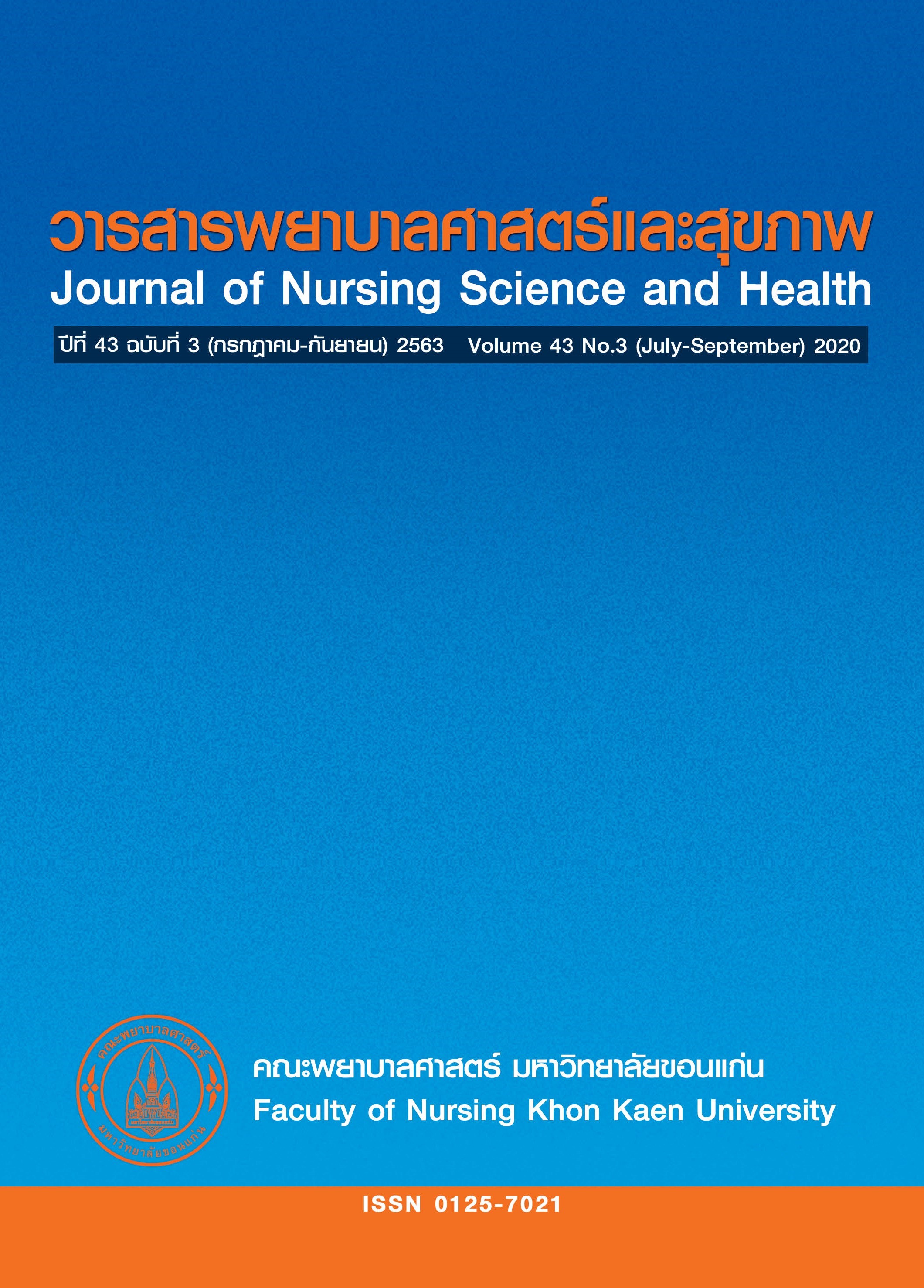ความชุกและปัจจัยเสี่ยงต่อการบาดเจ็บจากเข็มทิ่มตำของนักศึกษาพยาบาลในจังหวัดเหอหนาน ประเทศจีน
คำสำคัญ:
การถูกเข็มทิ่มตำ; อันตรายจากการทำงาน; นักศึกษาพยาบาลบทคัดย่อ
การศึกษาเชิงพรรณนาแบบภาคตัดขวางนี้ มีวัตถุประสงค์ เพื่อประเมินอัตราความชุกและปัจจัยเสี่ยงต่อการบาดเจ็บจากเข็มทิ่มตำของนักศึกษาพยาบาลในมณฑลเหอหนานประเทศจีน กลุ่มตัวอย่างเลือกโดยวิธีการสุ่มแบบง่าย จำนวน 400 คน เก็บรวบรวมข้อมูลโดยใช้แบบสอบถาม วิเคราะห์ข้อมูลโดยใช้สถิติเชิงพรรณา และสถิติเชิงอนุมาน ได้แก่ Multiple logistic regression ผลการศึกษาพบว่า ความชุกของการบาดเจ็บจากเข็มทิ่มตำ ร้อยละ 67 และปัจจัยเสี่ยงต่อการบาดเจ็บจากเข็มทิ่มตำ คือ เพศหญิง ( aOR= 2.9,95% CI=1.1–7.9) ความรู้เรื่องการป้องกันเข็มทิ่มตำ (aOR =2.8, 95% CI= 1.6–4.8) และทัศนคติเชิงลบต่อการป้องกันเข็มทิ่มตำ (aOR 9.0, 95% CI 3.5–23.3) สมาคมการพยาบาลของประเทศจีน สามารถใช้ผลการศึกษาปรับปรุงกฎข้อบังคับและกำหนดแนวทางการป้องกันเข็มทิ่มตำของนักศึกษาพยาบาล
เอกสารอ้างอิง
Sriram S. Study of needle stick injuries among healthcare providers: Evidence from a teaching hospital in India. J Fam Med Prim Care 2019;8(2):599–603. doi:10.4103/jfmpc.jfmpc_454_18
Auta A, Adewuyi EO, Tor-Anyiin A, et al. Global prevalence of percutaneous injuries among healthcare workers: A systematic review and meta-analysis. Int J Epidemiol 2018;47(6): 1972–80. doi:10.1093/ije/dyy208
Gupta D, Saxena S, Agrawal VK, et al. Study of knowledge, attitude and practice of needle stick injury among nurses in a tertiary care hospital. Int J Community Med Public Heal 2019; 6(2):865. doi:10.18203/2394-6040.ijcmph20190221
Zhang X, Chen Y, Li Y, et al. Needlestick and sharps injuries among nursing students in Nan-jing, China. Workplace Health Saf 2018;66(6):276–84. doi:10.1177/2165079917732799
Bao J, Wang F, Hu C. Investigation of needlestick injuries among nursing students in the gen-eral hospital. J Nurs Adm 2015;15(2):135-36.
Isara AR, Oguzie KE, Okpogoro OE. Prevalence of needlestick injuries among healthcare workers in the accident and emergency department of a teaching hospital in Nigeria. Ann Med Health Sci Res 2015;5(6):392–6. doi:10.4103/2141-9248.177973
Cooke CE, Stephens JM. Clinical, economic, and humanistic burden of needlestick injuries in healthcare workers. Med Devices (Auckl) 2017;10:225–35. doi:10.2147/MDER.S140846
Black Thomas LM. Nursing faculty experiences with students' needlestick injuries [published online ahead of print, 2020 Feb 20]. Nurse Educ. 2020;10.1097/NNE.0000000000000810. doi:10.1097/NNE.0000000000000810
Yao WX, Yang B, Yao C, et al. Needlestick injuries among nursing students in China. Nurse Educ Today 2010;30(5):435–7. doi:10.1016/j.nedt.2009.09.018
Zhao F, Zhang M, Xuan J, et al. A large-scale cross-sectional survey on needle-stick injuries related to injections of antidiabetics in China: incidence and infection rates. Value Heal. 2018; 21(1):S72. doi:10.1016/j.jval.2018.04.479
Suliman M, Al Qadire M, Alazzam M, et al. Students nurses' knowledge and prevalence of needle stick injury in Jordan. Nurse Educ Today 2018;60:23–7. doi:10.1016/j.nedt.2017.09.015
Lukianskyte R, Gataeva J, Radziunaite L. Needle sticks and sharps injuries experienced by staff nurses and nursing students and their prevention. Int J Infect Control 2012;8(1):3–9. doi:10.3396/ijic.v8i1.002.12.
Guo YH, Lyu YY, Yang JH, et al. Data analysis on hepatitis B through pilot surveillance re-porting system in Henan Province, 2012-2016. Zhonghua Liu Xing Bing Xue Za Zhi 2018; 39(4):500–04. doi:10.3760/cma.j.issn.0254-6450.2018.04.023
World Health Organization. Joint WHO/ILO policy guidelines on improving health worker ac-cess to prevention, treatment and care services for HIV and TB. Geneva; 2010.
American Nurses Association. Workplace safety and needlestick injuries are top concerns for nurses. Silver Spring; 2008
Tirpude AP, Gaikwad M, Tirpude PA et al. Retrospective analysis of prevalent anatomy spot-ter's examination: an educational audit. Korean J Med Educ. 2019;31(2):115–24. doi:10.3946/kjme.2019.123
Setthamas M, Sawaengdee K, Theerawit T, et al. Incidence and risk factors of needle stick and sharp injuries among registered nurses in Thailand. J Public Heal Dev 2018;16(1):17–28.
Ghanei Gheshlagh R, Aslani M, Shabani F, et al. Prevalence of needlestick and sharps injuries in the healthcare workers of Iranian hospitals: an updated meta-analysis. Environ Health Prev Med 2018; 23(1): 44. doi:10.1186/s12199-018-0734-z
Zhang MX, Yu Y. A study of the psychological impact of sharps injuries on health care workers in China. Am J Infect Control 2013;41(2):186–7. doi: 10.1016/j.ajic.2012.02.023
Motaarefi H, Mahmoudi H, Mohammadi E, et al. Factors associated with needlestick injuries in health care occupations: A systematic review. J Clin Diagnostic Res 2016;10(8):IE01–04. doi: 10.7860/JCDR/2016/17973.8221
Wang C, Whitehead L, Bayes S. Nursing education in China: Meeting the global demand for quality healthcare. Int J Nurs Sci 2016;3(1):131–6. doi: 10.1016/j.ijnss.2016.02.009
Pavithran VK, Murali R, Krishna M, et al. Knowledge, attitude, and practice of needle stick and sharps injuries among dental professionals of Bangalore, India. J Int Soc Prev Community Dent 2015;5(5):406–12. doi:10.4103/2231-0762.165932
Madhavan A, Asokan A, Vasudevan A, et al. Comparison of knowledge, attitude, and practices regarding needle-stick injury among health care providers. J Fam Med Prim Care 2019;8(3): 840–5. doi:10.4103/jfmpc.jfmpc_103_19
Garus-Pakowska A, Górajski M. Behaviors and attitudes of Polish health care workers with respect to the hazards from blood-borne pathogens: a questionnaire-based study. Int J Environ Res Public Health 2019;16(5):891. doi:10.3390/ijerph16050891
Gogoi J, Ahmed SJ, Saikia H, et al. A study on knowledge, attitude, practice and prevalence of needle stick injuries among health care workers in a tertiary care hospital of Assam. Int J Community Med Public Health 2017;4:2031–5. doi:10.18203/2394-6040.ijcmph20172171
ดาวน์โหลด
เผยแพร่แล้ว
รูปแบบการอ้างอิง
ฉบับ
ประเภทบทความ
สัญญาอนุญาต
วารสารพยาบาลศาสตร์และสุขภาพเป็นเจ้าของลิขสิทธิ์ในการเผยแพร่ผลงานที่ตีพิมพ์ห้ามผู้ใดนำบทความที่ได้รับการตีพิมพ์ในวารสารพยาบาลศาสตร์และสุขภาพไปเผยแพร่ในลักษณะต่าง ๆ ดังนี้ การนำบทความไปเผยแพร่ออนไลน์ การถ่ายเอกสารบทความเพื่อกิจกรรมที่ไม่ใช่การเรียนการสอน การส่งบทความไปตีพิมพ์เผยแพร่ที่อื่น ยกเว้นเสียแต่ได้รับอนุญาตจากวารสารพยาบาลศาสตร์และสุขภาพ



